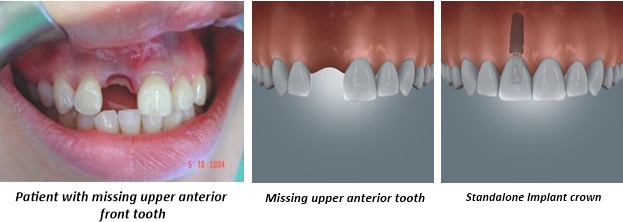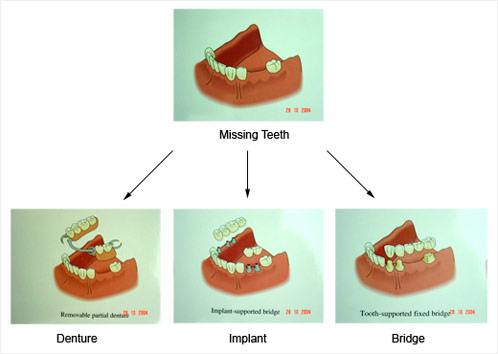What is dental implant?
Dental implant treatment is the preferred rehabilitation solution for missing teeth in many instances.
Dental implant is titanium screw inserted into the jaw bone to act as an anchor for a crown or a set of replacement teeth. A crown is connected to the titanium root to restore the missing tooth.

Dental implants can be used to support a number of dental prostheses, including crowns, bridges or dentures.

Prior to commencement of surgery, very careful and meticulous planning is required to identify vital structures such as the inferior alveolar nerve or the sinus, as well as the shape and dimensions of the bone to properly orientate the implants for the most predictable result. A CT scan will also be obtained prior to the surgery.
How successful is dental implant treatment?
Success of dental implant treatment varies. It is generally related to a sound treatment plan, the surgeon’s skill, experience, amount of the bone available at the implant site. The patient’s general health, oral hygiene and oral habits also influence the longevity of the implant.
The general consensus is that implants carry a success rate of up to 95% – 98%. With proper care, implants can last a lifetime.
What are the advantages of dental implants?
- Improves function i.e. comfort, biting and chewing
As implant tooth is fixed, it is very stable. Implant restorations feel like your teeth. It is more comfortable and stable compared to dentures which can move and need acrylic flanges and wires for retention. - Preserves healthy adjacent teeth and improves oral hygiene
As implants are standalone, they do not require sacrificing adjacent teeth with crown preparation. Implant allows access between teeth, thus facilitating easier maintenance of oral hygiene. - Preserves jaw bone
During chewing, the biting force that is transmitted down the implant into the bone acts as stimulant to preserve the jaw bone from shrinkage. - Restores appearance
Dental implant restoration look like your own teeth. - Long lasting
Unlike natural teeth, implants do not decay. With good health and good oral hygiene, implant can last very long, almost a life time.
Am I suitable for implants?
- Generally, all healthy patients can have implants as long as they have bone.
- Patients who have insufficient bone can still have implant treatment with bone grafting to bulk out their bone mass. Bone grafting and implant placement can be done simultaneously or as separate procedures.
- Patients with severe diabetes, heavy smokers and with history of previous head and neck radiotherapy are advised to consult your dentists to evaluate your suitability for implants.
- No patient is too old to have implants. However, very young patients who are still growing are advised to delay implant placement until the end of their growth spurt.

